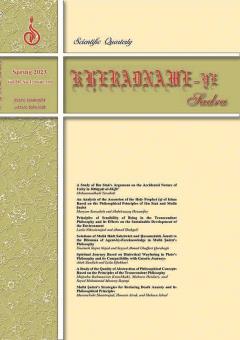-
-
List of Articles
-
Open Access Article
1 - Editor's Note
S. Mohammad Khamenei -
Open Access Article
2 - A Study of Ibn Sīnā’s Argument on the Accidental Nature of Unity in Ilāhīyyāt al-Shifā’
Mihammadhadi Tavakoli -
Open Access Article
3 - An Analysis of the Ascension of the Holy Prophet (ṣ) of Islam Based on the Philosophical Principles of Ibn Sīnā and Mullā Ṣadrā
Maryam Samadieh Abdulrazzaq Hessamifar -
Open Access Article
4 - Principles of Sensibility of Being in the Transcendent Philosophy and its Effects on the Sustainable Development of the Environment
Laela Nikooienejad Ahmad Shahgoli -
Open Access Article
5 - Solutions of Mullā Hādī Sabziwārī and Ḥassanzādeh Āmulī to the Dilemma of Agent-by-Foreknowledge in Mullā Ṣadrā’s Philosophy
Naeimeh NajmiNejad Ahmad Ghafari -
Open Access Article
6 - Spiritual Journey Based on Dialectical Wayfaring in Plato’s Philosophy and its Compatibility with Gnostic Journeys
Atiye Zandieh Leila Eftekhari -
Open Access Article
7 - A Study of the Quality of Abstraction of Philosophical Concepts Based on the Principles of the Transcendent Philosophy
Mojtaba Rahmanian Koushkaki Mohsen Heidari Seyyed Mohammad Musawy -
Open Access Article
8 - Mullā Ṣadrā’s Strategies for Reducing Death Anxiety and its Philosophical Principles
Manouchehr Shaminezhad Hossein Atrak Mohsen Jahed
-
The rights to this website are owned by the Raimag Press Management System.
Copyright © 2017-2026







